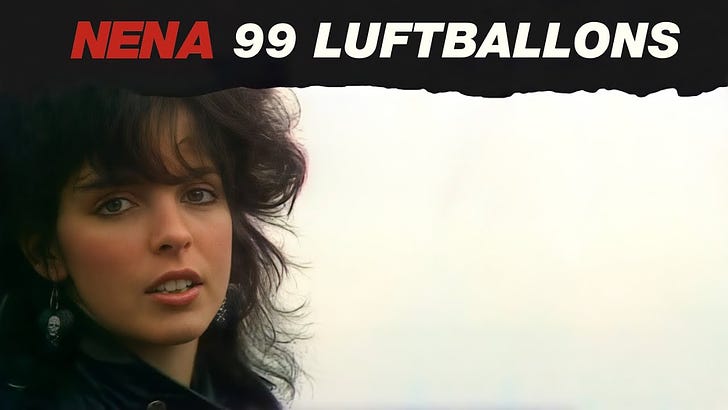While Germany has much to offer in the fall season, such as Zweibelkuchen, chestnuts, and freshly harvested wine, for many tourists, fall in Germany means just one thing: Oktoberfest. Contrary to understandable expectation, the world's largest Volksfest actually begins the second-to-last week of September and continues through the first week of October. Visitors from across the world flock to Bavaria to enjoy excessive amounts of sausage, pretzels, beer, and dancing in Festzelten on Munich’s Theresienwiese, all while wearing traditional German Tracht. The concept of Oktoberfest has become a bit of an international export as well, with Oktoberfest-themed celebrations taking place around the world each fall.
In addition to food and drink, Oktoberfest is also known for its “Wiesn-Hits” – popular German songs which can perennially be heard echoing through the Festzelten. One such Wiesn-Hit is yet another of Germany’s most enduring international exports – “99 Luftballons” by German new wave (Neue Deutsche Welle) / pop rock artist NENA.
Hast du etwas Zeit für mich?
Do you have some time for me?
Dann singe ich ein Lied für dich
Then I'll sing a song for you
Von neunundneunzig Luftballons
Of ninety-nine balloons
Auf ihrem Weg zum Horizont
On their way to the horizon
Denkst du vielleicht grad an mich?
Are you thinking of me right now?
Dann singe ich ein Lied für dich
Then I'll sing a song for you
Von neunundneunzig Luftballons
Of ninety-nine balloons
Und dass sowas von sowas kommt
And that something like this comes from something like that
The 1983 anti-war song tells the story of ninety-nine flying balloons that are mistaken for UFOs, ultimately leading to a senseless and devastating war with no winning side. It’s certainly a heavy subject for a song that has become a backdrop for celebration and good times. However, the upbeat nature of the song alongside its continually relevant themes have made it an enduring classic which is well-known around the world. In 1984, NENA also recorded an English version of the hit, “99 Red Balloons”, which also found international success.
From a language perspective, “99 Luftballons” gives us a quick refresher on how numbers are structured in German. While in English the number 99 is written or spoken as “ninety-nine”, German expresses the same quantity as “neunundneunzig” – nine and ninety. This scheme is seen all the way from the einundzwanzig (21) to 99, and is then again reflected in larger numbers such as vierhundertsiebenundzwanzig (“four hundred seven and twenty” – 427). Edward Swick makes a clever (and musical!) connection to German numbers in his book “The Everything Learning German Book”, recalling the line from the English nursery rhyme “Sing a Song of Sixpence” that mentions “four and twenty blackbirds baked in a pie”. That’s certainly a helpful reminder of how to think about German numbers!
Here are a few additional words from “99 Luftballons” to add to your vocabulary list:
der Luftballon - the balloon
der Horizont - the horizon
der All - outer space
die Fliegerstaffel - a flying squadron
der Düsenflieger - the jet plane
das Feuerwerk - the fireworks
der Kriegsminister - the minister of war
das Streichholz - the match
der Benzinkanister - the petrol can
der Krieg - the war
der Sieger - the victor
die Trümmer - the rubble
fliegen - to fly
Wishing you much good food, drink, and music in the week ahead,
Jessica
P.S. – If you enjoyed this post, please consider clicking “like” and/or sharing it with someone else who may be interested in German music, language, and culture! Ganz lieben Dank!
From the Sprachmelodie Archives 🎵
For more female-fronted pop rock classics, check out music “Leichtes Gepäck” by Silbermond and “Nur ein Wort” by Wir sind Helden. And for cozy fall vibes, check out the Sprachmelodie playlist “Gemütlicher Herbst” on Spotify.
Discover more German Music and Language
Check out Sprachmelodie's Spotify and Youtube accounts for playlists of all songs featured so far on the blog.




I think English speaking (or listening) audiences don't realise what that song is actually about. I mention this in the book I'm writing in a chapter on German pop music and it's under appreciated influence on British artists.
Your post made me think of being in Karlsruhe in 1974, struck by the still visible bomb damage in residential neighbourhoods but delighted by the stands around the city selling fresh wine from Baden and slices of Zwiebelkuchen (which I now cook a few times every fall and winter). I lived later in München, studying but working to supplement my scarce funds (first at the Grossmarkthalle, then the Hotel Vier Jahreszeiten). I never wanted to go to Oktoberfest, though, I guess those funnel-shaped sinks in the beer halls seemed to foreshadow what I might find on the Theresienwiese :)